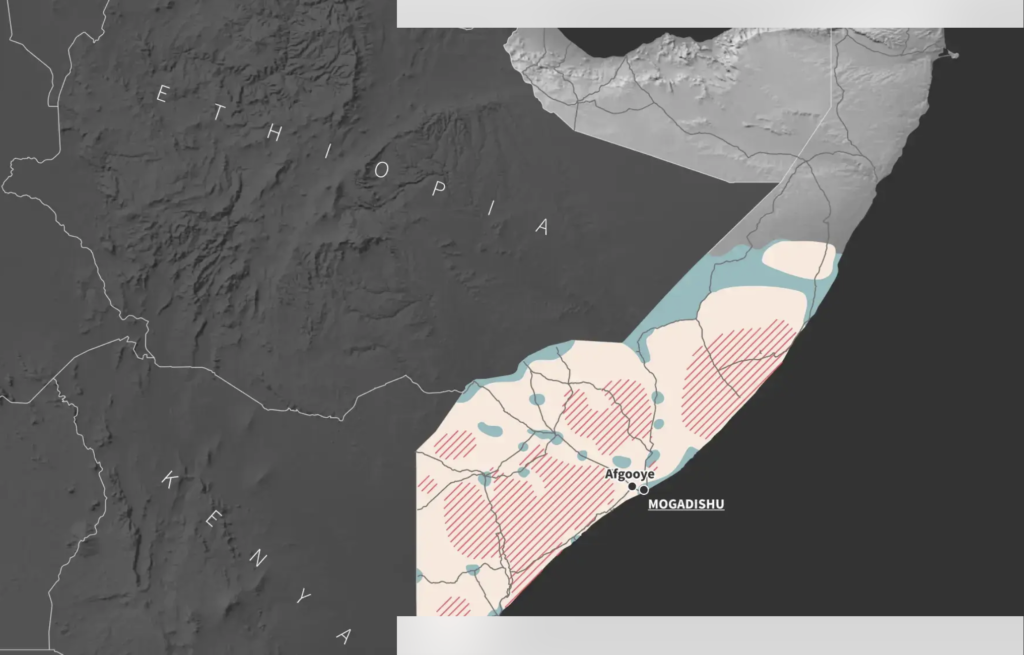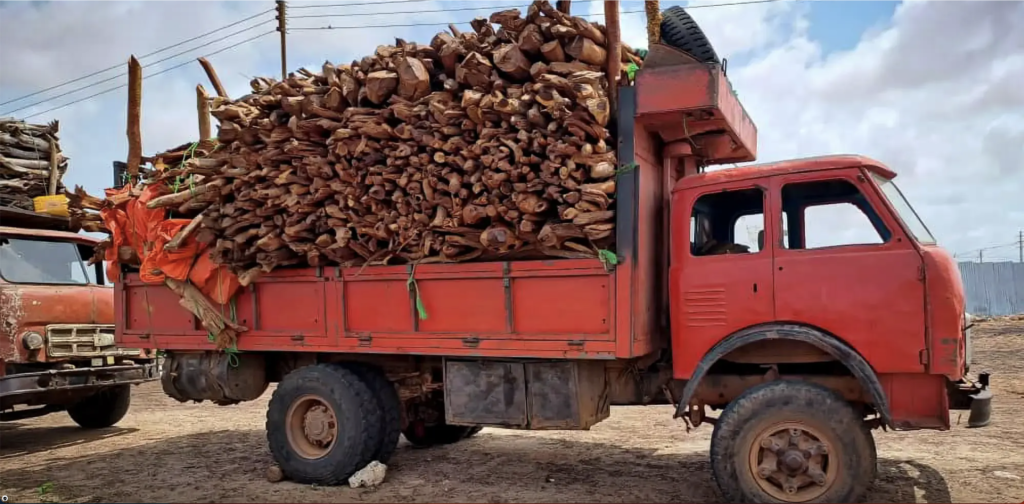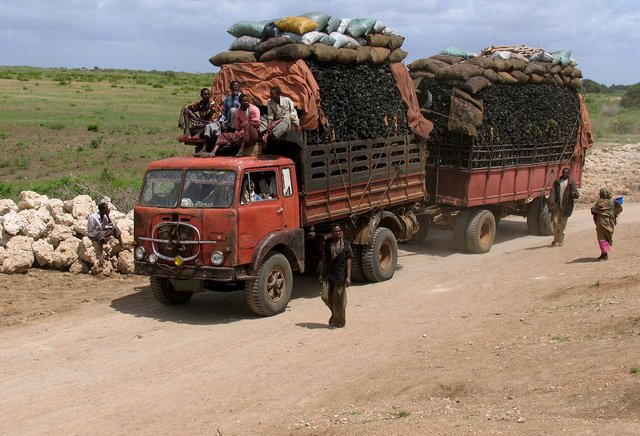MOGADISHU (KAAB TV) – The lucrative charcoal trade in Somalia serves as a significant source of revenue for both the government and the militant group Al-Shabaab, a new investigation report has revealed.
Despite the government’s official stance against the al-Qaeda-linked militant group, it seems that common interests prevail when it comes to exploiting this profitable business. And now, the parties are covertly pursuing common interests through this illicit charcoal trade.
The report by CORRECTIV, a German-based non-profit newsroom, sheds light on how both state officials and Islamists profit from the multi-million-dollar charcoal trade, which poses a significant threat to the environment and local livelihoods. This exploitative business operates through domestic and international trade channels, as well as through the systematic extortion of vulnerable individuals struggling to survive.
Victims impacted by this system bravely share their first-hand experiences, highlighting the difficult choices they face despite the substantial risks involved.
Charcoal serves as the primary source of energy for Somalis, with the UN estimating that 98 percent of households in Somalia’s towns and cities rely on it for cooking and heating. However, the production and trade of charcoal for export have been banned by law in Somalia since 2012.
Using satellite images and photos, expert Niklas Jordan verifies the statements made by those involved in the charcoal trade, revealing a complex and lucrative operation that generates millions of dollars for the Islamists.
8.2 million trees cut down
Abdalle Ahmed Mumin, one of the journalists involved in the investigation, explains that the illicit trade cannot be stopped because it remains profitable for both sides, benefitting both the Somali army and Al-Shabaab.
“At checkpoints outside Mogadishu, Al-Shabaab imposes taxes and extorts money from truck drivers, while the government-controlled checkpoints within the capital charge even higher amounts,” said Mumin, who also serves as the secretary-general of the Somali Journalists Syndicate.

The consequences for nature and the climate are catastrophic, with a joint study by the EU and the UN’s Food and Agriculture Organization (FAO) revealing that between 2006 and 2012, about 7% of Somalia’s already limited vegetation was destroyed for charcoal production, particularly during Al-Shabaab’s reign.
Despite the UN Security Council’s ban on the Somali charcoal trade in 2012, followed by the government’s implementation, an additional 8.2 million trees, primarily acacias, have been cut down and converted into charcoal.
Somalia remains a divided nation, with the government controlling the capital and other cities while the sources of charcoal – often referred as “black gold” – extend deep into the hinterland, under Al-Shabaab’s rule.
Somali charcoal, derived from acacia wood, holds significant appeal among shisha enthusiasts and fetches a premium price in the market. Notably, a study conducted in 2014 by GRID Arendal, an environmental-focused non-profit organization, revealed that the exports of Somali charcoal predominantly reach destinations such as Dubai, Sharjah, and Khasab in the Arab Emirates, in addition to Kuwait, Yemen, Saudi Arabia, Egypt, and Lebanon.
Large-scale deforestation predominantly occurs in Jubaland, Lower Shabelle, and Bay, as detailed in the investigation.
Profit for both parties
Both Al-Shabaab and state representatives are implicated in profiteering, with the militants imposing taxes on the hungry, traders, and aid workers, while also targeting anyone engaged in tree cutting, crop cultivation, or livestock sales. The testimonies from those directly involved paint a harrowing picture of brutality and extortion.
The revenue generated from the charcoal trade remains a significant source of income for Al-Shabaab, much like opium for the Taliban in Afghanistan. While more recent estimates are unavailable, the investigation uncovers the continued high revenue streams, particularly from exports to the Gulf region, estimated at over 15 million US dollars.
Local sources reveal that the charcoal trade has expanded exponentially and involves not only Al-Shabaab but also representatives of the Somali state. The soldiers responsible for protecting government territory often demand their own “tax,” contradicting their role to confiscate trucks engaged in illegal charcoal trade. This lack of enforcement reflects the government’s complicity in the trade.
Drivers transporting charcoal face extreme brutality, with reports of beatings and even trucks being set on fire. The Islamist blockade makes bypassing checkpoints nearly impossible, leaving truckers at the mercy of Al-Shabaab’s demands.
“Sometimes they beat us up, and once Al-Shabaab even set my truck on fire.” one driver named Aaden reports being abducted while on the road to Mogadishu. “They held us hostage for several days, we begged and bribed them until we were finally free.”
Somali truckers reveal the daunting obstacles they encounter while attempting to navigate the limited roads leading from the arid acacia forests of Jubba, Lower Shabelle, and Bay regions towards the coastal areas. These routes serve as cash points for al-Shabaab.
“I drive charcoal sacks from Gobanle in Lower Shabelle to Mogadishu,” says Abshir, who, like Aaden, drives trucks loaded with wood or charcoal.
Anyone who transports logs and branches which still have leaves on them officially violates the restrictions imposed by the Islamists themselves.
Abshir says that he only has one choice in the end, “I’ll pay whatever Al-Shabaab demands.” In the end, there is not much left for him, he says. “I earn just enough for daily meals, rent, water, that’s it.”
Abshir would like to change jobs, to do something less dangerous. “Charcoal is contraband and can be confiscated at any time, I’m obviously aware of that, but I have a family to support.”

On May 24, the US Department of the Treasury’s Office of Foreign Assets Control (OFAC) announced new sanctions against 26 individuals and entities associated with the terrorist organization al-Shabaab. This includes 15 financial facilitators and operatives, four charcoal smugglers, and seven affiliated companies.
The Treasury Department stated that the move aims to disrupt key regional leaders, affiliates, and members involved in various activities supporting al-Shabaab, including financial facilitation, business operations, fundraising, proliferation of Improvised Explosive Devices (IEDs), and illegal charcoal smuggling from Somalia.
The investigation revealing the dangerous collusion between the Somali government and Al-Shabaab in the illicit charcoal trade, with devastating consequences for both nature and livelihoods, calls for immediate action, according to environmentalist Daaud Mohamed Nur.
“Urgent action is required to address this issue, preserve Somalia’s fragile ecosystem, and alleviate the plight of those trapped in this exploitative system,” he says.
Despite these alarming revelations, the Somali government’s Ministry of Information declined to comment on the allegations and remained silent on the presence of extensive charcoal production facilities within government-controlled areas.


